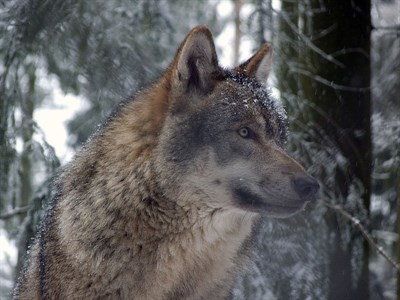
Image Credit: (SOURCE: Wikipedia)
December 05, 2012 - 5:41 PM
B.C.'s burgeoning wolf population and its impact on other wildlife populations and livestock is not just a northern issue, it's right here in the Okanagan, says an Enderby rancher. The question is what to do about it.
Len Bawtry, a member of the Cattlemen's Association of B.C., sees a simple answer.
"Wolves need to pretty well be exterminated," he says. Bawtry has hundreds of cattle on his ranch, and has noticed losses from wolf predation are on the rise.
On Nov. 14, the B.C. government released a draft management plan for wolves that includes wolf kill contests and prizes for killing the biggest wolves. Wolf hunting is also permitted in provincial parks. These are all measures Bawtry believes must be taken.
"Ranchers can't afford to have cattle chewed up by wolves," says Bawtry. He adds it was rare to see a wolf when he was a boy growing up in the area, but in the past 15 years, they've become much more common.
"Just last week a moose and its calf were being chewed up by about four wolves," says Bawtry. He says it's common for his cattle to be attacked from the rear and left unable to walk—if they're even left alive. Bawtry says he sees bigger packs every year. Bawtry believes wolves are to blame for depleted caribou numbers, and as those populations nosedive, wolves will turn more and more to livestock.
"Some ranchers have quit in the Kingfisher area," he says.
The Cattlemen's Association says more than 2,700 head were lost in B.C. in 2011, and an estimated 1,000 were due to predation.
These kinds of numbers are liable to cause an over-reaction and that's exactly why wolf advocate Sadie Parr is trying to balance the debate before the cull goes too far.
She told roughly 40 Vernon residents Wednesday that B.C. must act now to save wolves and their place in the ecosystem. Wolves are far from being considered endangered in Canada, but Parr says they face an extremely dire future with current hunting regulations.
"It legitimizes systematic killing," Parr says. "The B.C. government wants to kill wolves for sport, to appease ranchers, and to save caribou."
The true culprit for plummeting numbers of caribou, Parr says, is habitat loss and urbanization.
"Wolves are being used as scapegoats," says Parr, who noted that logging and oil and gas exploration destroy habitat.
"But it's not only logging and exploration," she adds. "Do we really need another shopping mall?"
Parr says the reintroduction of wolves at Yellowstone National Park proves their worth as a "keystone species," meaning wolves bring balance to the ecosystem.
"Songbirds not seen in years returned to the park," says Parr. Beavers and numerous plants also coincided with the return of the top predator. Despite these insights, many still see the keystone predator as nothing more than a big bad wolf.
"What we don't understand, we fear," says Parr. She says wolves have been demonized for centuries, and that we must learn to see them differently.
"If wolves can't live in Canada, where in the world can they live?"
Parr encourages the public to lobby the government to end wolf culls in B.C.
For further information, visit http://www.canadianwolfcoalition.com/.

"Im sorry, I just can't smile for the picture with what's going on," said Sadie Parr.
(CHARLOTTE HELSTON / iNFOnews.ca)
—Charlotte Helston
chelston@infotelnews.ca
(250)-309-5230
News from © iNFOnews, 2012